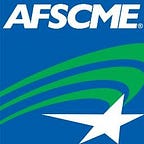By Elissa McBride
Striketober and Strikesgiving are over, but worker strikes are still going strong. As I write this, Kellogg’s workers are holding the line in Michigan, Nebraska, Pennsylvania and Memphis. Alabama miners are heading into their ninth month of standing up to Warrior Met Coal. And the wave of worker actions demonstrating power and the fight for fairness continues to rise.
Strikes are a last resort for workers because they require intense planning, sacrifice and discipline. The uptick in strike activity and the increased support for striking workers is a sign of the times: workers have had enough. Workers are tired of going backward while corporate bosses and the ultra-wealthy cash in. Together, many workers are making the tough decision to walk off the job to achieve change.
The use of the strike as a tool for demonstrating worker power has deep roots and will endure beyond 2021. Before this year of rising worker power ends, I want to shine light on a significant strike in AFSCME’s history. This year marks the 40th anniversary of the San Jose pay equity strike, the first such strike in U.S. history.
In the late 1970s, San Jose city employees were frustrated with flat wages and pay inequities for women workers. They believed that job categories dominated by women were undervalued and underpaid. They proved it through a multi-year campaign for pay equity led by AFSCME Local 101/Municipal Employees Federation, AFSCME Council 57. Their efforts went a long way towards closing pay gaps, but it wouldn’t have happened without a strike in 1981.
The leaders of the fight were clear about the issue: certain jobs in the city were dominated by women workers, and despite the high level of knowledge, judgement and skill required for those jobs, they were the lowest paid. As union leader Joan Goddard put it in an interview with an AFSCME archivist, “It’s not just women; it’s women’s work. There are a lot of male librarians who don’t get paid what they should be getting paid.” For the members of the Municipal Employees Federation, it was a fight to raise the wages in those undervalued jobs, from clerical workers and data analysts to librarians and recreation leaders.
In 1980, the union negotiated an agreement with city management to conduct a study of the value and the pay levels of all municipal job categories. The city had conducted a similar study at the management level, resulting in closed pay gaps. Workers had high hopes that the city would follow suit for non-management workers, but management objected. While agreeing that the job segregation existed, and that women were clustered in the lower paying jobs, they refused at first to do anything about it. Management even insisted that the cost of closing those gaps would have to come out of cost-of-living increases for all workers.
Union members said “hell no” to that. Workers walked off the job on July 5, 1981, the day after the previous agreement expired.
They walked the picket line for 10 days. They remained strong even when management sent letters to all bargaining unit employees threatening to fire them if they did not return to work. In fact, they turned that management tactic on its head by setting up a barbecue grill in front of City Hall and burning their letters at a huge rally. As Goddard put it, “The moose stands firm, and he does not give in. So, our union mascot became the moose.”
On July 14, they settled the strike, winning cost-of-living increases for all employees and a separate pool of money for pay equity adjustments for employees in female-dominated job classes. Over the next five years, $1.75 million was spent to close the gaps. Workers delivered a massive victory for employees in the bargaining unit, for pay equity and for union power. According to the president of the Municipal Employees Federation at that time, more than 500 city workers — women and men — became new members during the campaign.
It’s worth remembering this strike as we celebrate its 40th anniversary. It fanned the flames of other pay equity campaigns led by AFSCME locals and councils across the country, from Washington state to Minnesota to Connecticut. It positioned AFSCME as a leader on the issue of pay equity for women and people of color — a fight we are still waging. It is part of the history of our union’s growth, especially among women in public service. And it reminds us of the power of collective action, then and now. Another leader in the fight, Patt Curia, said it best when she talked about the strike victory: “That’s why you need a strong union.”
Elissa McBride is the secretary-treasurer of the American Federation of State, County and Municipal Employees (AFSCME), AFL-CIO.
